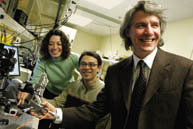Moving On Up (Page 2)

Medhi El Ouali

David Plant with graduate students Madeleine Mony and Bing Xia
A Unique Relationship
Perhaps the most significant difference between the undergraduate and graduate experience is the interaction between student and supervisor. David Plant, who calls graduate students "the lifeblood behind our research," makes a telling joke about the importance of the relationship: "Prior to marrying my wife, my relationships with my PhD students were longer than with most of my girlfriends!"
The quip demonstrates just how serious he is about his supervisory role. A James McGill Professor in electrical and computer engineering who has won the Carrie M. Derick Award for Excellence in Graduate Teaching and Supervision, Plant says, "The commitment to the PhD student is the strongest commitment I'll make to mentoring and guiding a student through a degree. It's imperative that it gets done right. These are people who are very bright, who have a lot of energy and, properly guided, can go on to do amazing things."
Medhi El Ouali also sees supervision as a crucial aspect of the PGSS portfolio. "We organize workshops to explain how to interact well with your supervisor," he says. One of the difficulties he sees grad students encounter is that "sometimes supervisors are absent." They don't necessarily see "where you're on track or off track."
Plant points out that the relationship is a two-way street. "If students are left unattended, it's really unfair. But like any relationship, if there isn't solid, frequent, bi-directional communication, there will be a breakdown. Students need to express to their supervisors that they need attention, and supervisors need to express to their students, 'I'm seeing a problem.' Or 'I'm seeing success.'" Perhaps inevitable in long-term projects, somewhere along the line, there comes a period of existential crisis.
"I call it the doldrums," says Plant, "and it tends to happen about halfway through the PhD degree. A PhD starts out with enthusiasm, energy and naiveté, and about two years in, the winds die down. Both the student and the supervisor need to persist - it's a very hard point for both. You've got to commit to grinding on. And then all of a sudden the wind picks up, the student catches something and it sweeps them away."
Plant's own research in photonics is costly, highly experimental, and has enormous potential in communications and technology industries - and he is candid about the self-interest in seeing the relationship succeed, an obligation not just for the supervisor, but for the student as well. "I may be signing up a PhD that over four years is going to cost me a quarter to half a million dollars [in research funding]. I'm happy to spend that money, but with a recognition that 'hey, we're in this together. Let's do it.'"
More to Come
Many departments around the University are looking to beef up one aspect of grad studies or another, as is the case in engineering. "One of the top priorities for the faculty is to increase quality and quantity of our doctoral student population," says Plant, pointing to a recently announced initiative that broadens support for PhDs. "We're offering at least 27 three-year Dean's Doctoral Student Research Recruitment Awards, and we'll be making offers to candidates using this award as an incentive to get them to come to McGill."
Overall, the University will be taking a nuanced approach to building its grad student base, increasing recruitment, helping more students graduate, and searching for new funding support.
"We'd actually like to increase the number of graduations per year by about 25%," says James Nemes, "by improving completion rates and decreasing the time it takes to finish a degree. If we do this, the number of grad students registered does not have to increase dramatically."
The students meanwhile will no doubt be reaping the benefits that increasing competition among universities generates. More attention, more funding, more emphasis on the crucial role they play.
Those graduating in the coming years will be stepping into a market where competition to replace aging professors is also stiff. They may be paying dues now in hard work and tight budgets, but graduate education done right means the payoff will be big indeed - for the students, for universities and for society.


